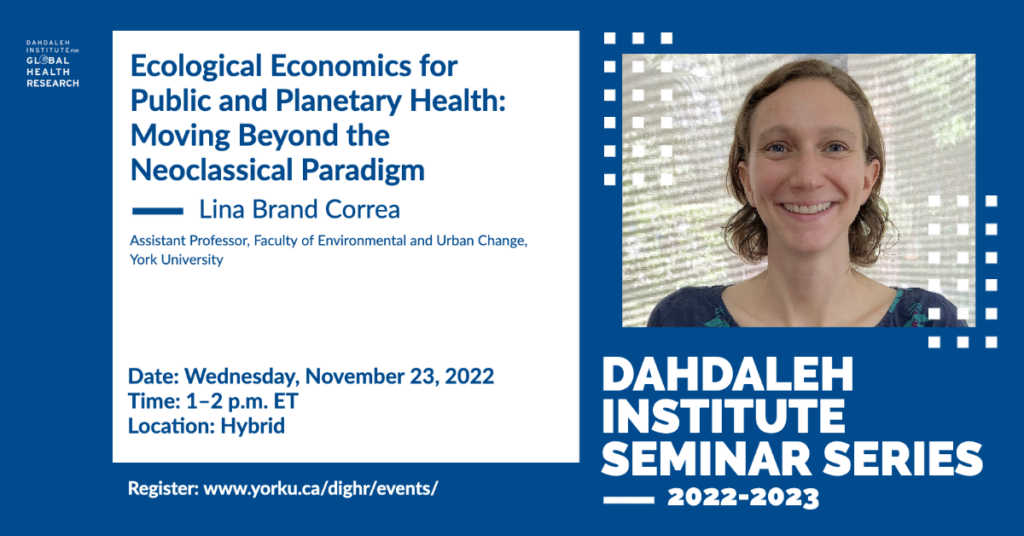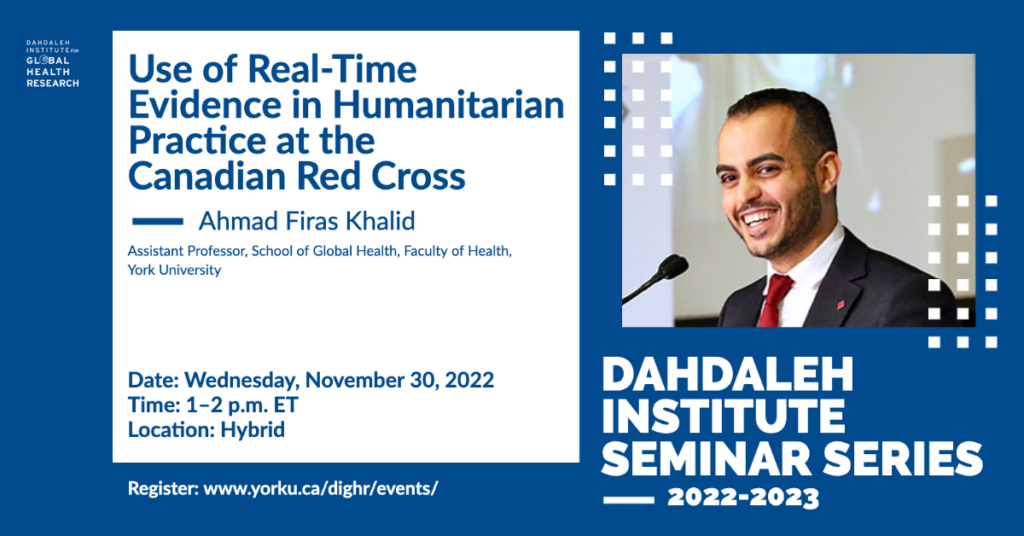
The Dahdaleh Institute for Global Health Research will feature three events in November from its Global Health Research Seminar Series.
All talks will be delivered in hybrid format. Everyone is welcome. Attendees will join global health leaders, researchers, practitioners and students and during the series, they will have an opportunity to learn about the important collaborative and transdisciplinary research happening at the Dahdaleh Institute (in the thematic research areas of planetary health, global health and humanitarianism and global health foresighting).
The full schedule of events is available at https://www.yorku.ca/dighr/events/.
Wednesday, Nov. 9, 1 to 2 p.m.
Priority 21st-Century Issues in the Prevention and Control of Noncommunicable Disease in Low- and Middle-Income Countries, with Arun Chockalingam
The human body is a replica of the universe or a planet. Any imbalance in the human body leads to a disease state, be it communicable or noncommunicable. Similarly, the imbalance we create in the planet results in planetary damage, which in the long run leads to the fury of the planet and natural calamities. Humans are the masters of their own destiny.

Noncommunicable diseases (NCDs) have mostly been acquired as we evolved. Their root causes are based on the way we live, the way we behave, the way we eat. As countries evolve economically, our lifestyles and behaviour change in comparison to the previous generation.
As a consequence of economic growth, a small percentage of people tend to accumulate wealth, widening the gap between the haves and have-nots. This divide makes it unaffordable for most to meet their basic needs. This disparity occurs both between high-income countries (HICs) and low- and middle-income countries (LMICs) and within countries.
The issues of the 21st century demand a major change in the way we think and act to protect the health of individual citizens, the nation, and the planet. The call to order includes equitable and sustainable health for all.
In this seminar, Arun Chockalingam will discuss all three thematic areas of the Dahdaleh Institute for Global Health Research: planetary health, global health and humanitarianism, and global health foresighting.
Chockalingam is a professor of global/public health and medicine at the University of Toronto. He was the founding director of Global Health at the University of Toronto’s Dalla Lana School of Public Health (2013-18), founding director of the Office of Global Health at the National Heart, Lung, and Blood Institute, US NIH (2010-13), founding director of Global Health at Simon Fraser University, Vancouver (2005-10), and an academic and health researcher for over 40 years. He has served in key executive positions at the Canadian Institutes of Health Research (CIHR), Health Canada and the World Hypertension League.
Wednesday, Nov. 23, 1 to 2 p.m.
Ecological Economics for Public and Planetary Health: Moving Beyond the Neoclassical Paradigm, with Lina Brand Correa
There are multiple ways in which our economic system influences the health of both people and planet. We know this intuitively and empirically, and therefore public and planetary health scholars often discuss ways in which we can develop an economic system that benefits people and planet. However, these discussions are often developed within the neoclassical economics paradigm, and direct engagement with heterodox economic schools of thought has been lacking.

This seminar presentation aims to highlight the contributions that one such heterodox economics school of thought (ecological economics) can make to the fields of public and planetary health, juxtaposed against what neoclassical economics orthodoxy proposes.
Ecological economics offers an opportunity to make the transition to an economic system that is designed to promote human and planetary health from the outset, rather than one where social and environmental externalities must be constantly corrected after the fact. Important ideas from ecological economics include the use of a multidimensional framework to evaluate economic and social performance, the prioritization of well-being and environmental goals in decision making, policy design and evaluation that take complex relationships into account, and the role of provisioning systems (the physical and social systems that link resource use and social outcomes). Ecological economics also proposes possible interventions at the national scale that could promote public health and that align with the prioritization of social and ecological objectives, including universal basic income or services and sovereign money creation.
Lina Brand Correa is an assistant professor in the Faculty of Environmental and Urban Change at York University in Toronto. She completed her PhD ("Following the ‘golden thread’: Exploring the energy dependency of economies and human well-being") at the University of Leeds, following an MSc in ecological economics at the University of Edinburgh. Her research interests include the impact of energy systems on climate change, energy return on investment, energy (service) requirements for the satisfaction of human needs, energy poverty, and the impact of provisioning systems on well-being.
Wednesday, Nov. 30, 1 to 2 p.m.
Use of Real-Time Evidence in Humanitarian Practice at the Canadian Red Cross, with Ahmad Firas Khalid
The Canadian Red Cross (CRC) provides health care services to the most vulnerable. A key priority of CRC is to ensure that all programs are scientifically based and that decisions are informed by the best available evidence to ensure effectiveness and efficiency of interventions. This seminar will detail efforts to support real-time evidence use at the Canadian Red Cross (CRC), showcasing real-world examples of evidence summaries answering pressing questions in the midst of a health and humanitarian emergency.

Dr. Ahmad Firas Khalid will present his CIHR Health Systems Impact–funded work on the implementation of efforts to support real-time evidence use at the Canadian Red Cross.
Firas Khalid is a medical doctor, a health policy and system researcher and lecturer, and a knowledge translation professional. Firas Khalid completed his medical degree at St. George’s University School of Medicine and his PhD in health policy at McMaster University. Firas worked as a senior research manager at Evidence Aid working on creating a World Health Organization (WHO) Knowledge Hub on emergency disasters research management and with the Pan American Health Organization (PAHO) on the creation of Resilient Health Systems collection to advise member states. He is also a CIHR Health System Impact Fellow and a Mitacs Elevate Training Fellow working on implementing efforts to support real-time evidence use in humanitarian practice at the Canadian Red Cross. Firas Khalid is a board member for Doctors Without Borders, where his responsibility is to set the strategic direction for the entire Canadian branch of the organization.
